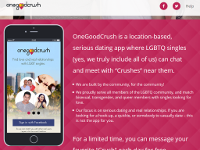LGBTQ Dating app OneGoodCrush offers Dating for Everyone
- Thursday, July 23 2015 @ 10:33 am
- Contributed by: kellyseal
- Views: 1,913

There have been a lot of breakthroughs recently for the LGBTQ community. The Supreme Court ruled on the legality of gay marriage across America, overriding state laws that made it illegal. Caitlyn Jenner disclosed her transition from male to female in an interview with Diane Sawyer, and later showed off her new body in Vanity Fair to a public that embraced her. Celebrities like Ruby Rose and Miley Cyrus have recently stated that they identify as “gender-fluid,” or as both male and female, bringing gender identity conversations into the spotlight.
It only makes sense that in this moment of time where people feel more free than ever to live their truth – there is also a dating app that helps you find that special someone, no matter how you identify. At least, that is what OneGoodCrush aims to do.
Launched this week, OneGoodCrush aims to help people in the LGBTQ community find long-term relationships. But they aren’t limiting their potential user base. Founder Frank Mastronuzzi wants everyone to feel they can find someone special using the app, including those who identify as heterosexual, or who do not define themselves as male or female.
"We wanted to be inclusive of everyone -- even heterosexual people can use our app," he told USA Today. "Letters on LGBTQ keep adding over time, but wherever you fall on this spectrum, you have a place on this app."
OneGoodCrush connects users through their Facebook and Instagram accounts to pull photos and profile information. The app works like Tinder and other dating apps, where each user is presented with photos and profiles, allowing them to swipe left and right to reject or accept a match. But while other dating apps like Tinder and Grindr offer same-sex dating options, they are limited when it comes to allowing users to communicate their own gender identity. The big difference between OneGoodCrush and other dating apps is that its members can claim their own gender identity -- man, woman, transgender man, transgender woman, or queer -- and then choose the gender(s) they are seeking.
According to the company’s records, the app has so far attracted about 100,000 users since its soft launch three months ago. Of the users that have signed onto the app, 57% identify as gay, 37% identify as lesbian, 4% have identify as transgender, 1% identify as queer, and less than 1% identify as straight.
Having the ability to identify as a transgender seems obvious in online dating, but it hasn’t been the case. As Trish McDermott, Strategic Advisor for OneGoodCrush states: "It seems online dating is one of the last bastions separating people, and that is kind of mind blowing. I think the industry has a responsibility to invite everyone."

